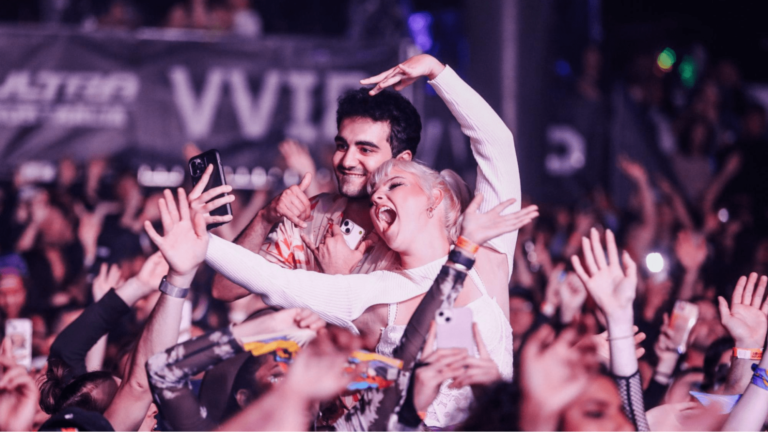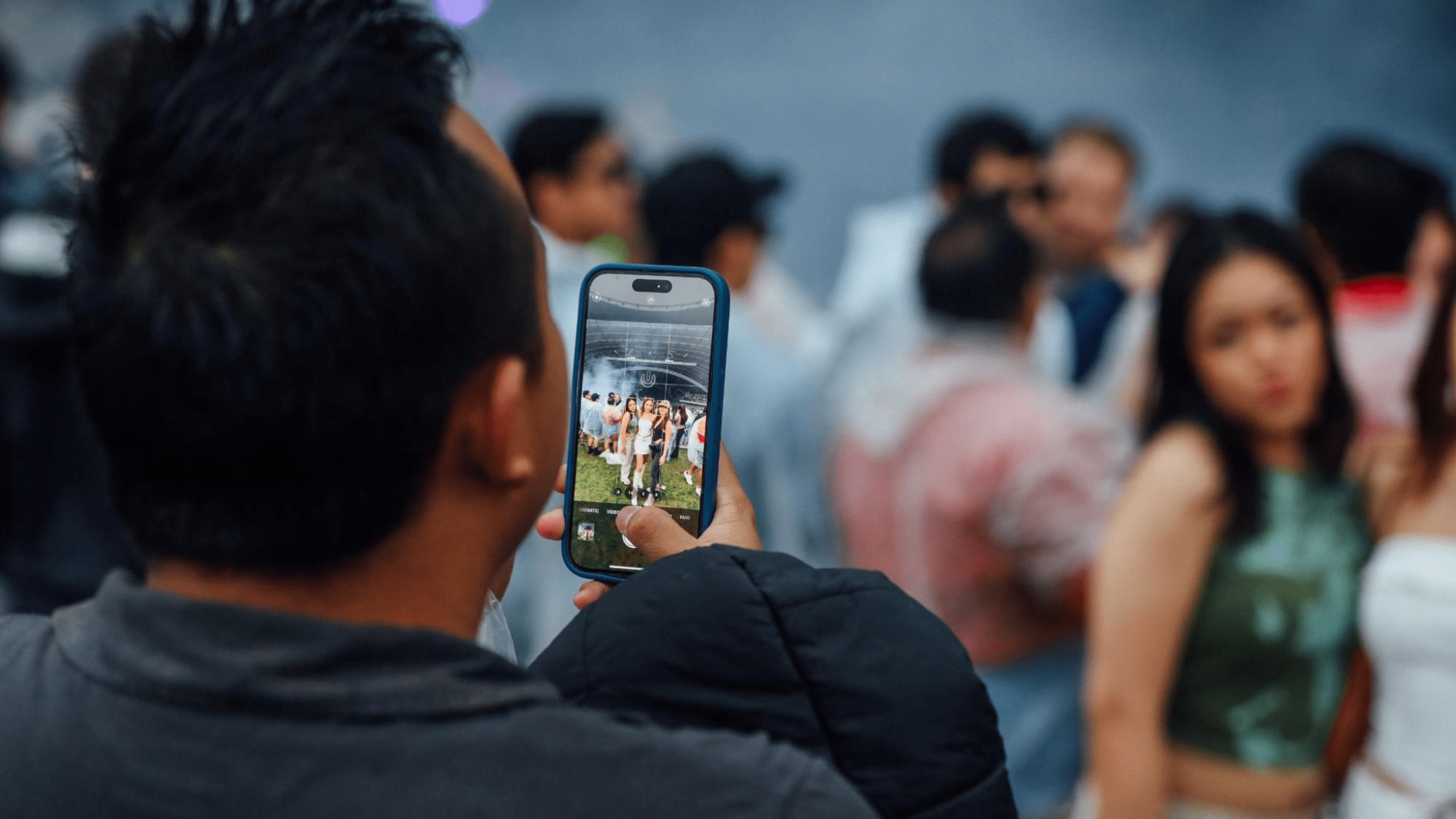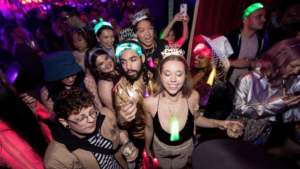We all know that social media platforms are a simple and cost-effective way to expand your reach and convert scrolls into sales.
But social media goes so much deeper than ticket sales.
Social media is where your communities live, laugh, and connect. If you want to build a following and convince people to put down their phones and come out to your next event, you’ve got to engage with them online.
That’s why we’ve created this guide. At Eventbrite, our range of integrations and marketing tools are designed specifically to boost your social reach and get people talking about your events.
If you’re new to social media marketing or want to get more leverage, we’re sharing 10 tips on why and how you can capitalise on social media for your next event.
How to use social media for events
1. Choose your social networks wisely
2. Create a bold and unique event hashtag
3. Upgrade your profiles before promoting your event on social media
4. Create (and sell tickets through) a Facebook Event
5. Collaborate with social media influencers
6. Invest in tools to streamline promoting your event on social media
7. Host social contests and ticket giveaways
8. Create behind-the-scenes stories
9. Create ‘tag-a-friend’ content
10. Push social ads using geotargeting and geofilters

Why is it important to build your events around social media?
There are over 57 million people in the UK on social media, which equates to 84.4% of the entire UK population.
An essential part of exploiting that potential is reaching your target audience online quickly. Done the right way, you could have millions of users seeing your posts in a short time span.
For example, take a look at Busspepper Promotions — one of London’s biggest Caribbean experience and soca event creators.
By using Facebook’s targeting functionality to promote events to “lookalikes” (people with similar online behaviour as previous ticket holders), past attendees, and people who’ve indicated their interest in soca music, they were able to reach 26,791 different people and sell 699 tickets through a single ad campaign.

Social media gives your event attendees a chance to join the conversation. By engaging with potential attendees and giving them a voice, they’re more likely to turn up to your event on the day.
Cultivating your social media community can also be super rewarding and increase brand awareness. Developing a relationship with your followers may later turn them into customers.
How to use social media for events: 10 pro tips
If you’re new to the social media game or are looking for ways to boost engagement, knowing where to start can be tricky.
That’s why we’ve assembled 10 essential tips from event professionals and real Eventbrite creators to help you boost your reach and make your next event a runaway success.

1. Choose your social networks wisely
Depending on your industry and target audience, some social platforms may be more effective than others. The social media channels with the biggest audience reach are Facebook, X (Twitter), and LinkedIn, but there’s no one-size-fits-all, and your content should be tailored around each channel.
💡Pro tip: According to Nick Lee-Rogers, Head of Experimental at the Hatch Group, the key to choosing the right networks for marketing your event is pinning down your audience.
“Knowing your target market is the biggest thing to making a successful event. So gather as much detail as you can from different sources,” he explains.
“Deciding which platforms to focus your efforts on will come out of your extensive research into your target audience and what channels they use. You would be unlikely to promote a corporate conference via TikTok or advertise a day rave on LinkedIn, for example.”
Bearing that in mind, here’s the rundown on the UK’s most popular networks and who you’ll find there.
Facebook is virtually synonymous with social media. Almost half of the global population is on Facebook, making this platform perfect for engaging with followers and promoting events.
Facebook lets you create event pages, share updates, live stream video with Facebook Live, and use targeted advertising to reach specific groups.
Demographics:
- 85% of Facebook users are over the age of 25
- Facebook’s biggest audience is men between 25 and 34 years old
- Facebook is the platform of choice for over-50s

Instagram, the highly visual social media platform, is a great place to share beautiful images, cool videos and reels of past events, behind-the-scenes footage, and teaser posts to drive attendee engagement.
Demographics:
- Two-thirds of Instagram users are under 34 years old
- Instagram’s largest audience is men between 18 and 25 years old
- Only 15.3% of Instagram users are over the age of 45
TikTok
TikTok is a short-form video platform that’s taken the world by storm. You can live stream, send video replies, and create duet video reactions to existing content.
Demographics:
- Over 37% of TikTok users are under 24 years old
- Most regular TikTok users are women
- The average UK TikTok user spends 27 hours a month on the app
YouTube
With an estimated 2.5 billion active users worldwide, YouTube has a much larger audience than any other video platform on the web — and it offers tonnes of advertising and promotional opportunities for event creators.
Demographics:
- One in five YouTubers are 25 to 34 years old
- Baby Boomers and Generation X are YouTube’s fastest-growing demographic
- YouTube’s UK reach is 57 million (which is 85% of the UK’s population)
LinkedIn is great for B2B and industry networking, making it a great place for corporate events, company news, and event announcements.
Demographics:
- Four out of five LinkedIn users are over the age of 25
- LinkedIn users have double the buying power of any other network
- LinkedIn has 38.1 million users in the UK

X
You might still know it as Twitter, but the recently rebranded X is still one of the most active and engaging communities on social media. X enables creators to use posts and a dedicated hashtag to build excitement before and during their events.
Demographics:
- Three out of four X users are over the age of 25
- Almost two-thirds of X users are men
- 84% of X users say they mainly use X on their mobiles
Snapchat
Snapchat, a channel that favours spontaneity, allows you to engage with potential customers and build a sense of exclusivity around your events. It also has some cool features that make it easier to gather followers, like the Snapcode.
Demographics:
- One in five Snapchat users are under 18 years old
- There are 22.15 million Snapchat users in the UK
- 89% of social media users in the UK know about Snapchat
Spotify
Spotify is the perfect place for popular and up-and-coming musical acts to promote shows and tours to fans. This streaming service lets you curate playlists, self-release indie music, and publish podcasts.
Demographics:
- Over half of all digital music users in the UK are on Spotify
- Spotify is tied with Amazon Music as the UK’s most popular music streaming service
- One-third of all UK Spotify users are under 24 years old
Twitch
Twitch is an Amazon-owned video live streaming platform that’s especially popular among gamers. It enables users to live stream activities and insert commentaries on top. While X may offer similar content, Twitch’s interactive features and vast network of passionate communities offer a unique, immersive experience for users.
Demographics:
- 80% of Twitch users are male
- 10% of UK social media users say they’re on Twitch
- Twitch users streamed a combined 1.3 trillion minutes worth of content globally in 2022

Pinterest is a unique social network that lets users create digital boards and ‘pin’ links to your website. Many people use Pinterest as a search engine platform, which can help to drive traffic to your website.
Demographics:
- Around three out of four UK Pinterest users are women
- 80% of Pinterest users are over the age of 25
- Almost a quarter of UK social media users say they’re on Pinterest
One to watch: Threads
In July 2023, Meta announced it was launching a new social platform called Threads. Just like X, Threads is primarily a text-sharing service — but it’ll be integrated with other Meta platforms like Facebook and Instagram to make sharing between social media networks fast and frictionless. Not available in the UK yet, but keep your eyes peeled.
2. Create a bold and unique event hashtag
Create and promote a personable hashtag on all relevant communication channels. Spread the hashtagged word on your event website, in your promotional emails, print materials, and more. Videos are getting more attention than ever, so include a hashtag where viewers can easily notice it, such as in a corner or footer.
Want to see how it works in practice? Check out Scottish event creator Arnprior Farm and the way they use hashtags to get their unique farming events in front of Instagram users.
During the event, make sure your hashtag is visible, so your guests know to use it. Include it in handouts, and display it on screens throughout your venue. Better yet? Give people incentives to use your hashtag or share your event on social media.
This could mean setting up a photo booth branded with your hashtag or creating a photo competition where the best photo using your branded hashtag wins a prize.
💡Pro tip: When crafting the perfect hashtag, sometimes less is more.
“Brevity is the name of the game on Instagram, since your photos should speak for themselves. For Grammarly, 60% of our top captions feature sentences of three words or less, and our top-performing post of 2018 featured a caption that simply said ‘Yes!’ with a hashtag,” says Celeste Mora, former Social Media Manager at Grammarly.
“You can use up to 30 hashtags per Instagram post, although we tend to use either just one hashtag, or between five and seven.”

3. Upgrade all online profiles before promoting your event on social media
Before you promote your event on social media, create sleek headers and thorough company descriptions and update any existing pages to include your upcoming event.
- Stay consistent across all channels: Be sure that your social channels are consistent with usernames, URLs, headers, and descriptions.
- Optimise your social media “about us” sections: Include a thorough description of your company with keywords that’ll help prospective attendees find your page, and include a mention of your event as well.
- Interlink all of your social media pages: This will allow fans to follow additional pages for news and updates.
Think of your social media accounts like a portfolio page. Would someone coming to them for the first time be excited to learn more about your brand?
Don’t let your social media presence look outdated. Spruce up your virtual footprint if you want to succeed at promoting events on social media.
💡Pro tip: Timing can make or break a social media post. If you’re promoting an event on your platforms, make sure you release content at intervals leading up to the big day, so potential guests have plenty of reminders.
4. Create (and sell tickets through) a Facebook Event
There are more than 52 million active Facebook users in the UK. But with more creators using the platform for social media event promotion, you need to make your events stand out from the crowd.
When creating your Facebook Event, be sure to:
- Choose a cover photo that looks good on any size screen
- Be specific about location, time, and category so Facebook can help promote your event
- Craft a compelling event description
- Put your ticketing link front and centre
Want to see how it works in practice?
Check out event creator Cyrenians. By using Facebook event pages to directly promote and sell tickets for their Eventbrite events, they’re able to boost their reach and remove friction for social users keen to buy tickets without leaving the Facebook app.

💡Pro tip: If you use Eventbrite, you can sell tickets directly on Facebook.
In fact, events that sell tickets directly on Facebook drive two times the free registrations and 20% more purchased ticket sales on average than events that redirect to a ticketing page. Use Eventbrite’s Add to Facebook feature to see those benefits ASAP.

5. Collaborate with social media influencers
Building relationships with key people in your industry who can talk up your event can help influence interested attendees to register.
Influencers can be found on each of your social media channels, so it’s easy to come across many who interact with the same target audience as you do.
Influencers can assist with giveaways or contests, sharing discount codes, brand ambassador testimonials, sponsored posts, social media takeovers, or just about anything else you can dream up.
Not sure where to start your influencer marketing? Check out the Eventbrite community for a range of networking opportunities to connect with global influencers.
Consider what type of influencer would better suit your event:
Celebrity influencers: These public figures are widely recognised and possess a substantial following and influence.
Macro-influencers: These influencers have larger followings and a broader reach.
Micro-influencers: These individuals have smaller audiences but boast high engagement rates.
💡Pro tip: If your target audience is on Instagram, the platform is perfectly designed for influencer marketing. You can use the Instagram Collab feature to post content about your event in partnership with vendors, co-hosts, the venue, or special guests to get more eyeballs on it.
6. Invest in tools to promote your event on social media
If you’re not careful, developing and scaling a strong social media strategy for events can be a drain on your resources. That’s why it’s worth using an all-in-one social media tool that can give you a holistic view of all your social activity on one convenient dashboard.
For example, using a dashboard like Eventbrite Marketing Tools, you can:
- Plan and schedule more efficiently: You can’t be online 24 hours a day, so use tools that help you plan, organise, and schedule your posts.
- Create and curate diverse content: Social media content curation platforms help you find interesting content. Bookmark a blog post or a video that relates to your topic.
Event planning tools like those that Eventbrite offers will save you time and energy, reducing the stress of event planning.
💡Pro tip: When it comes to social media management tools, data is your friend — and so you should be looking for platforms that offer advanced analytics to create actionable insights. That’s why Paul Ashurst, Senior Events Manager at Bournemouth 7s Festival, turned to Eventbrite’s Marketing Tools.
“One of the most considerable advantages of the statistics we get from Eventbrite is that we don’t just throw ideas at a wall and hope something’s going to stick,” he says.
“We now have the data we need to make informed, strategic, and sound investments, especially when it comes to marketing and promotion.”

7. Host social contests and ticket giveaways
Wish your followers shared your posts more? Make it happen with social media contests.
Social media is vital for event promotion, but you can’t just rely on your own accounts to spread the word — you have to get event-goers to share it as well. When you’re looking for new ideas for how to promote your event on social media, contests motivate word-of-mouth promotion without a huge investment.
For lessons in best practice, look no further than event creator Bonkers Bingo. Their regular contests on social media are a fantastic example of how to get more eyes on your events by offering up a couple of free tickets.
💡Pro tip: Make sure to consult with a solicitor and post contest rules that reflect your local legal requirements around promoting contests and giveaways. You don’t want to risk your reputation for a social media promotion.
8. Create behind-the-scenes stories
One of the most tried-and-tested ways to enhance the rate of interaction between you and your audience is to improve your storytelling vehicle.
Using Instagram Stories is a great way to build excitement for your event by showcasing small snapshots and snippets of event prep.
More than 500 million people engage with stories — and the best part is that your content doesn’t have to be slick or polished. In fact, 85% of social users say they prefer less-polished and unbranded content, so don’t solely tailor your social media to your event; provide some more casual content for users, too.
Translation: If you have something interesting or entertaining to share (even an epic fail), post it. This is a great way to humanise your brand and build a connection with ticket holders before an event.
💡Pro tip: Even if your stories are funny or irreverent, give them a clear call to action (CTA).
Make it easy for people to act upon what you’re asking of them. For example, if you’re promoting the end of early bird ticket sales, link directly to your ticketing page — not to an FAQ page.

9. Create ‘tag-a-friend’ content
Build an online community and extend your reach by creating content that encourages followers to tag their friends.
For example, when setting up a giveaway, you could stipulate that people need to tag two friends to enter the contest. This social media event strategy will exponentially increase your social reach — hopefully leading to conversions and ticket sales.
💡Pro tip: The most effective posts often just encourage people to tag a friend they think would like an upcoming event. You can also use this strategy for giveaways.
That’s what event creator Gloagburn Farm Shop does to drive traffic to its event pages for sunflower picking sessions — and it’s a fast and simple way to get people talking and build awareness.
10. Push social ads using geotargeting and geofilters
Ali Shakeri, senior growth and operations manager at Eventbrite, tells us it’s a pay-to-play environment if you want to get your content in front of the right people.
That means supplementing organic posts with paid social ads. To craft an engaging social media advertisement, be sure to include:
- An eye-catching image or video
- Short and sweet post text
- An even shorter headline
- A direct call to action
- An accurate link description
Use geotargeting to home in on your target audience.
Platforms like Snapchat let you geofilter for your attendees — while TikTok and Instagram also have tools that allow you to customise your content and enable other users to share your message organically.
You can also create stickers and filters in these popular social media channels.
Since they’re fun and interactive elements, users happily apply them to their own content and spread the word in a less salesy way. With these professional-looking features, you can personalise your posts and create entertaining plugs for upcoming events at the same time.
💡Pro tip: Make sure to be as specific as possible when building your audience profiles for social ads. For example, choose the cities, interests, or number of children you know your target attendees are likely to have.
Not only will this save you money promoting your posts, but it’ll help you sell tickets faster.
Start increasing social media engagement today
As an event creator, social media can be your bread and butter. After all, you’ve already got the passion and the vision it takes to put together a once-in-a-lifetime event.
Now, it’s time to use that passion and start spreading the word.
By developing a social media strategy, incorporating lots of visuals, enlisting influencers, and encouraging engagement with contests and shareable stories, you’ll reach a wider target audience that will amplify your marketing efforts.
That means more tickets sold and a more incredible event experience for every ticket holder.





